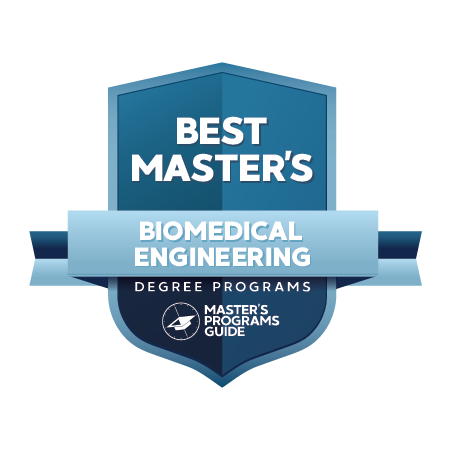Ready to find your ideal master's program?
www.mastersprogramsguide.com is an advertising-supported site. Featured or trusted partner programs and all school search, finder, or match results are for schools that compensate us. This compensation does not influence our school rankings, resource guides, or other editorially-independent information published on this site.
Dig into the world of biomedical engineering. You’ll find it’s easy to get carried away with the Dr. Octopus of it all!
This is, after all, the field that blends engineering with medical science.
How far of a leap is it from improving the fit of a prosthetic foot to the hero-defeating villainy of robotic super appendages?
Pretty far, it turns out. The reality of biomedical engineering (BME) is less “climactic, city-leveling superhero battle.” And it’s more “meticulous study and research.”
“Biomedical engineering” is an umbrella term that comprises numerous fields. The Bureau of Labor Statistics puts it simply.
What is a Master’s Degree in Biomedical Engineering?
Biomedical engineers combine engineering with medical science to design and produce equipment, devices, computer systems, and software used in health care. That generalization overlooks the many specializations within biomedical engineering.
There are medical devices like implants, biomedical sensors, prosthetics, and orthotics.
There’s also:
- bioinformatics (using software to study biological data)
- tissue engineering
- genetic engineering
- neural engineering
- biomaterials
- optics
- imaging
- bionics (i.e., artificial body parts)
The list goes on and on.
Many universities have their own specialties under the biomedical engineering umbrella. This can be further personalized depending on students’ interests and career aspirations.
BME is an interdisciplinary field. It emerged in the past few decades as its own field, and not just a specialization of engineering itself. Many schools’ BME programs are fairly new. For example, the one at San Jose State University only became a separate entity in 2018.
See Also: 10 Best Master’s in Industrial Engineering
Admissions Requirements for the Top Biomedical Engineering Graduate Schools
For any aspiring biomedical engineering student, being accepted into one of the top graduate schools is essential to success.
Admissions requirements are becoming more demanding due to an increasing number of people interested in the profession. Many of these top schools require test scores such as Graduate Record Examination (GRE) scores. The top graduate biomedical engineering schools also ask for college transcripts with a high GPA as part of their admissions process.
These test scores and grades provide universities a snapshot into each applicant’s academic background. They also give them the vital information needed to match up with the right program that coincides with a student’s personal goals.
In many cases, the top BME graduate schools also ask students to submit the following:
- Personal statements
- Letters of recommendation
- Evidence of work experience
- TOEFL scores
- An interview
How Much Money Can You Make After Completing Biomedical Engineering Programs?
Pursuing a career in biomedical engineering can be rewarding. And not just in terms of personal satisfaction.
Biomedical engineers can contribute to the advancement of treatments for health issues from all around the world.
Pursuing a degree in these fields also offers some generous financial rewards. According to analyses from U.S. News & World Report, salaries for biomedical engineering roles are around $92,000 per year. This is an impressive wage that cater to all levels of experience.
From entry-level jobs to those requiring significant expertise and qualifications, biomedical engineers can enjoy access to a promising profession with ever-increasing potential.
Ready to Earn a Degree in Biomedical Engineering?
There are countless opportunities within the BME subfield. Common engineering fields that you might choose to pursue include:
- Medical and biological engineering
- Molecular bioengineering
- Mechanical engineering and other applied sciences and engineering disciplines
- Medical technology and translational medicine
- Neuro engineering
- Regenerative medicine and artificial organs
- Biological engineering and systems biology
Ready to become a biomedical engineer? Check out our biomedical engineering graduate programs rankings!
Best Biomedical Engineering Graduate Schools
#1 – GEORGIA INSTITUTE OF TECHNOLOGY-MAIN CAMPUS
MASTER OF SCIENCE IN BIOMEDICAL ENGINEERING
Engineering is Georgia Tech’s raison d’etre. So it makes sense that this university has one of the best biomedical engineering graduate schools, too.
When the school opened its doors in 1888 as the Georgia School of Technology, it offered one degree. That was engineering. It opened to help bring some industrial knowhow to the agrarian South. It later adopted the name Georgia Institute of Technology in the 1940s. This was to reflect its emergence as a leader in technological and scientific research.
Biomedical engineering fits into the school’s mission. It makes it the obvious choice for the top spot on our list. And we’re not the only ones who see it this way.
In early 2019, three engineers from its Coulter Department of Biomechanical Engineering won the distinguished Gordon Prize for Innovation in Engineering and Technology Education. The award is from the National Academy of Engineering. It recognized their “pioneering program” of “fusing problem-driven engineering education with learning-science principles.” The school’s biomedical engineering program is on the cutting edge. Even better, it’s affordable. At a net price of $16,950, Georgia Tech in the bottom half of our list for cost.
The program is fairly new by Georgia Tech standards. It began in 1997. But it is also unique, in that it’s the result of a partnership between public and private universities. This is between Georgia Tech’s College of Engineering and Emory University’s School of Medicine. That partnership has resulted in a curriculum and research focus on six areas:
- biomedical images and instrumentation (think MRIs, CT scans, PET scans, ultrasounds, etc.)
- biomaterials and regenerative technologies (working with living tissue)
- cellular engineering and mechanics (working on the cellular level)
- biomedical informatics and systems modeling (developing software for understanding biological data)
- neuroengineering (working within neural systems)
- biomedical robotics (robots!)
The BME degree requires 30 credit hours. There are both thesis and non-thesis options. The latter requires 30 hours of coursework. This includes at least three each in bioscience, engineering, and data science, and at least nine hours of electives. The thesis track limits coursework to 21 hours.
Students take the same courses, except for six hours of electives. There are nine hours of thesis work. Each student designs their best mix of bioscience, data science, and engineering courses with an advisor. This is based on their background, professional goals, and research interests.
Prospective students must:
- hold a bachelor’s degree from an accredited institution
- have experience with biomedical engineering, such as a bachelor’s degree or professional work
This master’s degree in biomedical engineering is without a doubt one of the best in the world. With access to countless medical diagnostics research facilities, bio imaging facilities, and much more, it has a lot to offer in the field of biomedical innovation.
#2. SAN JOSE STATE UNIVERSITY
MASTER OF SCIENCE IN BIOMEDICAL ENGINEERING
San Jose State’s history dates back to 1857. But its biomedical engineering program may be the newest of the schools on this list. Don’t let its age fool you, though. Even though this school is new to medical and biological engineering, it is one of the top biomedical engineering grad schools in the world.
The Biomedical Engineering Department was established as a separate entity in July 2018. SJSU didn’t offer degree programs in biomedical engineering – at the undergrad or graduate level – until 2011. Prior to that, students could study bioengineering as an emphasis in an engineering bachelor’s degree.
SJSU wasted no time since establishing biomedical engineering as a degree. It brought on faculty and built new facilities for the program. It now includes 340 undergrads and 110 graduate students among its 32,000-plus student body.
This aggressive forward momentum is part of SJSU’s Transformation 2030. The school of engineering aims to realize “the university’s potential as a nationally prominent urban public university.”
And it’s on the way! U.S. News & World Report ranked San Jose State in its Top Public Schools for the western U.S. Its location in the heart of Silicon Valley makes it even more attractive for a tech-minded field like biomedical engineering.
The school has a battery of so-called “transition courses”:
- general chemistry
- calculus-based physics
- materials engineering
These either must be present on applicants’ undergrad transcripts (with at least a B average) or taken while at SJSU.
Prospective students need a 3.0 GPA to apply for the master’s program, or a GRE score of 315 or higher in verbal and quantitative reasoning, along with a 3.5 or higher in analytical writing.
San Jose State has 30 semester units for a master’s in biomedical engineering. These are accrued via two tracks: thesis or project.
The thesis option includes 16 units of coursework. Students will take applied sciences courses like:
- Physiology for Engineers
- Experimental Methods in Biomedical Engineering
- Medical Device Design and Principles
- Tissue Engineering
- Biomaterials
- Orthotics and Prosthetics
#3 – WORCESTER POLYTECHNIC INSTITUTE
MASTER OF SCIENCE IN BIOMEDICAL ENGINEERING
You’ll find another one of the best biomedical engineering masters programs at Worcester Polytechnic Institute.
Other programs speak in general terms about the applications of their curriculum. But Worcester Polytechnic Institute gets into specifics. Its grad students collaborate on projects like designing, producing, and testing biomaterials in engineered blood vessels. They create “a valve-scale 3-D in-vitro tissue model using heart valve cells.”
And at the foundation of WPI’s curriculum lies advanced, independent research (with advisor guidance) conducted at the school’s 125,000-square-foot Life Sciences and Bioengineering Center. It boasts an enviable list of lab and equipment capabilities, such as:
- biomaterials fabrication
- microfabrication
- bioinstrumentation
- histology
- cell culturing
Graduate students work on collaborative teams with faculty and industry partners. It feels less like top-down instruction and more like joint problem-solving. Another reason why this school is at the top of our biomedical engineering masters rankings!
Students are expected to have a bachelor’s degree or “strong background” in:
- engineering
- physics
- computer science
- life sciences
- applied sciences
- applied mathematics
This is the case with most programs offered by top universities in related fields. After all, that core knowledge is necessary to solve problems and innovate! And it means less coursework you’ll need to get caught up on beforehand.
WPI allows students to tailor their curriculum according to their academic background, interests, experience, and professional goals. During the first semester, students create an individualized Plan of Study. This is submitted to the Biomedical Engineering Department Graduate Studies Committee. Periodic check-ins with the committee ensure students remain on course to satisfy all degree requirements.
Like other programs on this list, WPI offers a master’s via a thesis- or project-based track. Both require 30 hours of study. These comprise 12 hours of BME coursework, a minimum of six credits for a thesis or project, and 12 credits of electives. Among the electives are courses like graduate-level engineering, math, and physics.
For added flexibility, some courses may be taken online. Coursework and thesis/final project work can be done via internships, co-ops within the industry, or even while the student is employed full-time.
#4 – GEORGE WASHINGTON UNIVERSITY
MASTER OF SCIENCE IN BIOMEDICAL ENGINEERING
George Washington had a lot of good ideas. It’s hard to say where “founding a national American university” falls on the list. And even harder to see how you could possibly overlook this top master’s degree in biomedical engineering!
One of GW’s biggest strengths comes from its location in Washington, D.C. This means proximity to renowned research hospitals and government agencies. These include:
- the Food and Drug Administration
- the National Institutes of Health
- the National Institute of Standards and Technology
- the Children’s National Medical Center
Like others, GW’s program takes two years to complete if studying full-time or three if studying part-time. It uses an interdisciplinary approach. This is to prepare students for the array of potential careers that a master’s in biomedical engineering affords.
The school also likes to showcase the breadth of study and research areas for students. These include:
- cardiac electrophysiology
- cancer therapy
- microfluidics
- optogenetics
- robotics
GW prefers prospective students to have an undergraduate engineering degree (with a minimum 3.0 GPA). People lacking one may still be granted admission. That’s as long as they take “deficiency courses” during their first semester at the school.
The biomedical engineering program requires 30 units. There are the standard thesis and non-thesis options. Both require 18 credits from required courses. The non-thesis option requires 12 elective credits. The thesis option comprises six elective and six thesis credits.
Among the elective options are:
- Introduction to Human Health in Space
- Regulatory Law for Medical Devices
- Image Engineering
- Biomedical Signal Analysis
GW is at the pricier end of the spectrum. However, U.S. News & World Report ranks it within its Best Value Schools. GW is also ranked on the publication’s Most Innovative Schools list.
#5 – STEVENS INSTITUTE OF TECHNOLOGY
MASTER OF ENGINEERING
Stevens Institute of Technology is a great place to earn a master’s degree in biomedical engineering. It is just outside of Manhattan in neighboring Hoboken, NJ. This school goes hard at biomedical engineering: It’s the second of the school’s six “foundational research pillars.” The master’s degree in biomedical engineering is housed at its Center for Healthcare Innovation.
SIT’s master’s program is flexible. The engineering school offers a master’s degree in biomedical engineering that is tailored toward the interests of aspiring biomedical engineers. Full- or part-time enrollment is available. There are both thesis and research tracks.
Prospective students who wish to become biomedical engineers must have a bachelor’s degree in engineering or physics (with a minimum 3.0 GPA). The school of engineering suggests that those who do not have one look into its master’s in bioengineering program.
The BME master’s degree has the standard 30 units of graduate work. Only six of them come in the form of required coursework. The other 24 hours are geared toward students’ research projects or professional development goals. Students on the thesis track earn nine thesis credits. Those who are not complete a six-credit research or design project. That is in addition to three credits of graduate coursework.
Courses for the master’s degree in biomedical engineering include:
- Strategies and Principles in Biomedical Design
- Selected Topics in Biomedical Engineering
- Biomechanics
- Natural Polymers in Medicine
- Movement Control Rehabilitation
- Introduction to Brain-Machine Interfaces
SIT is one of the more expensive options on this list, but it’s worth it. Take a look at the school’s website for a list of career opportunities:
- biomedical engineers
- clinical engineers
- regulatory specialists
Graduates from the engineering school are hired from major organizations such as:
- Merck
- Johnson & Johnson
- U.S. Veterans Affairs
SIT also touts its proximity to New York City. This metropolis is home to myriad BME companies and powerbrokers. All of them are just a short PATH train ride away.
#6 – LAWRENCE TECHNOLOGICAL UNIVERSITY
MASTER OF SCIENCE IN BIOMEDICAL ENGINEERING
Lawrence Technological University is in Southfield, MI. There are a few great reasons why this school tops our list of BME grad school rankings.
For one, it is just a little under 20 miles northeast of Detroit. Like everything else in Michigan, it owes its existence, at least in part, to Henry Ford. This legend loaned some space next to his Model T plant for the school to get started in 1932. At the time, Detroit was the center of innovation and manufacturing in the United States. Though it has seen hard times the past 40-plus years, it – and Michigan – has found new life in the tech industry.
This masters in biomedical engineering US has four dedicated instructors. LTU has a small biomedical engineering team. But they aren’t the only ones with BME on the brain. For example, Assistant Professor Jinjun Xia, from the school’s Department of Electrical and Computer Engineering, won a $151,000 grant in 2019 to study tissue-engineered blood vessels. This research falls right in the world of biomedical engineering.
If you want to earn a degree in biomedical engineering, this graduate school is a great place to do so. The school of engineering at LTU requires a bachelor’s degree in engineering (“or a related field”). You must have a minimum 3.0 GPA to enter its BME master’s program. The degree in biomedical engineering curriculum is similar to other programs. There are 30 credits required to graduate via a thesis or non-thesis track.
Students opting for the thesis route will need 18 credits in core classes. They need three to six in electives, and six to nine for their thesis. Project-based study also requires 18 credits of classes. For this degree in biomedical engineering, there are six to nine elective credits, and another three to six for their design project.
Among the basic foundational courses for the degree in biomedical engineering at this graduate school include:
- Engineering Analysis
- Quantitative Physiology
- Bioelectrical Physics
- Cell Mechanobiology
- Biomedical Simulations
- Surface Chemistry
- Applications of Engineering in Orthopedics
The LTU curriculum for the degree in biomedical engineering is collaborative. It pairs students and instructors for research. The school encourages co-ops and internships, so students get real-world experience before graduating.
The university hosts several job fairs throughout the year for employers with co-op positions. This engineering school even hosts an annual Science & Technology Showcase, where students and faculty discuss their work. This also draws employers from the region. In addition, the school offers workshops and individual coaching to help students prepare for the job market.
Don’t forget that financial aid is available at this graduate school, too!
#7 – MICHIGAN STATE UNIVERSITY
MASTER OF SCIENCE IN BIOMEDICAL ENGINEERING
Michigan State University is a powerhouse in sports, academia, and student-body population (more than 50,000 – 10,000 of them grad students). It is one of the best schools in the nation.
And as you might expect, its school of engineering one of the best places to earn a master’s degree in biomedical engineering. This university in central Michigan, in East Lansing, has long been one of the most well-known public universities in the United States. It joins the ranks of other top public schools like the University of California San Diego, Purdue University West Lafayette, the University of Michigan Ann Arbor, and others for a truly remarkable impact.
Michigan State boasts a lot of resources. It’s one of the best schools due to its research institutes and research areas, such as the Institute for Quantitative Health Sciences and Engineering (a.k.a. MSU IQ). This resource is a huge new research center “dedicated to basic and applied research at the intersection of engineering, human medicine, and natural science.”
The Department of Biomedical Engineering within the College of Engineering calls the IQ home. There are separate divisions for BME-related studies and research areas in:
- biomedical devices
- biomedical imaging
- neuroengineering
- synthetic biology
- drug delivery
- regenerative medicine
- artificial organs, medical devices, and human health
- imaging and instrumentation
To join MSU’s biomedical engineering program, prospective students need an undergraduate degree in BME or a related field. The university stipulates students lacking a BME undergrad degree may have to complete “collateral coursework.” This may not count toward the master’s degree. That is along with a GPA “that would indicate success in graduate study” (3.0 or above). GRE scores may be required.
Thesis-track students receive four to eight credits for their thesis. They must complete the “Biomedical Engineering Seminar.” The program has a suite of courses such as:
- Biomaterials and Biocompatibility
- Biofluid Mechanics and Heat Transfer
- Research Methods
- Biosensor Principles and Applications
- Selected Topics in Biomedical Engineering
Students in this BME program have more flexibility than they might at other engineering schools. Both master’s and doctoral students can conduct private research in areas of interest. Just one reason why this school tops our masters in biomedical engineering rankings!
#8 – FLORIDA INSTITUTE OF TECHNOLOGY
MASTER OF SCIENCE IN BIOMEDICAL ENGINEERING
Yet another school at the top of our biomedical engineering grad school rankings is Florida Tech.
It’s easy to see why. Do a search for “Florida Institute of Technology alumni,” and the results will be a bunch of people in space suits and important-looking military uniforms. This makes sense!
The university began in 1958 to support NASA. This was also founded in that year. It is in Melbourne, FL. Florida Tech lies just 35 miles south of the Kennedy Space Center, along what’s known as the Space Coast. The campus itself is just 20 minutes from the beach. As you might expect, this can be helpful or a hindrance when you’re earning your master’s degree in biomedical engineering!
Florida Tech’s BME master’s program requires an undergraduate degree in the field or one similar. If a student’s undergrad degree isn’t sufficient, preparatory coursework is required.
Once admitted, students choose from three areas of specialization for coursework and private research as they complete their master’s degrees:
- biomechanics
- biomedical instrumentation, imaging, and computation
- biomaterials/tissue engineering
Students must complete 30 credit hours to earn their master’s degrees. That’s either with a thesis or without one. Master’s students earning money through teaching or research assistantships must take the thesis route.
As other schools do, Florida Tech allows students to customize their coursework according to their interests. But they must submit a master’s degree program plan before completing nine credit hours.
Both thesis and non-thesis tracks demand nine semester credit hours of required courses:
- Biomedical Applications in Physiology
- Biomedical Engineering Analysis 1
- Applied Physiology
- Biomedical Engineering Seminar
Florida Tech’s BME site breaks down the course options for each specialization.
For instance, biomechanics requires:
- Advanced Biomechanics
- Orthopedic Biomechanics
Then students can choose another class from a list of six, such as:
- Transport Processes in Bioengineering
- Tissue Engineering and Regeneration
- Biomaterials
Students planning to write a thesis will need advance approval of the topic from their faculty committee. Non-thesis students must pass a final exam during their last semester in order to graduate. Financial aid is available.
#9 – FLORIDA INTERNATIONAL UNIVERSITY
MASTER OF SCIENCE IN BIOMEDICAL ENGINEERING
Florida International University has 48,000 domestic and international students enrolled. Found in Miami, the school ranks as one of the largest schools in the United States.
It’s also one of the best places to study if you want to become a biomedical engineer. The Carnegie Commission on Higher Education classifies it as a level R1 school for “very high research activity” in doctoral studies. The Department of Biomedical Engineering notes that it ranks high for best value and most popular BME programs nationwide.
It’s hard to argue about the value part. FIU’s program price is much lower than the next-cheapest one on our list. It is tens of thousands less than the most expensive. Tuition fees are low and there’s lots of financial aid available. For price-conscious prospective students, the cost alone would be enough to make FIU the best option. But it has so much more going for it!
It is unlike other biomedical engineering programs. These tend to split the field between thesis and non-thesis options. FIU offers three tracks and specializations:
- professional
- research
- orthotics and prosthetics
The professional specialization is geared toward engineers already working in the field. It is also for students interested in a management career within the biomedical industry. It requires 27 credit hours of coursework and a three-hour capstone project.
The research track prepares students for continued graduate study or a career in the research side of biomedical engineering. It offers thesis and project-based options. It has 30 credit hours. There is a minimum of 24 hours of coursework. This is 15 hours in specialty electives, six in math core courses, and three in a life-science elective. This includes one semester of the “Biomedical Engineering Seminar.”
Students working on a thesis earn six credit hours for it. The master’s project option offers three. The orthotics and prosthetics track includes training in life sciences and systems biology, such as:
- anatomy
- kinesiology
- applied science
- pathology
- normal pathological gait
It also offers engineering training with:
- chemical engineering
- biomechanics
- material science
- research skills
- the production and evaluation processes for orthotic and prosthetic devices
This track differs from the others in that the hours and course requirements are less regimented. It is but one step in a process toward certification. Earning a master’s in BME from this track prepares graduates for earning a certificate issued by another organization. For example, the International Institute of Orthotics and Prosthetics. A residency follows that. And finally, the Orthotics, Prosthetics, and Pedorthics Practitioner Certification Exam by the American Board of Certification. For people wanting to get into the field of orthotics and prosthetics, a master’s in biomedical engineering from Florida International University is a great first step.
#10 – VIRGINIA POLYTECHNIC INSTITUTE AND STATE UNIVERSITY
MASTER OF SCIENCE IN BIOMEDICAL ENGINEERING
Another one of the best master’s programs if you’re looking for a quality bioengineering program can be found at Virginia Polytechnic Institute and State University. The School of Biomedical Engineering and Sciences (SBES) is the result of a partnership among three entities:
- the College of Engineering
- the Wake Forest School of Medicine
- the Virginia-Maryland College of Veterinary Medicine
That trio means prospective students have numerous options to pursue here. From an MS or Ph.D. in biomedical engineering to a DVM/Ph.D. through the vet school or an MD/Ph.D. via Wake Forest’s medical school, this school has it all. Like the Georgia Institute of Technology, this school goes simply by Virginia Tech.
Students may enter the master’s program in biomedical engineering at Virginia Tech, in Blacksburg, VA, or at Wake Forest, in Winston-Salem, NC.
A 3.5 GPA is “preferred” (though there’s wiggle room on that one) with a BS degree. You’ll also need a GRE score of 310 or higher (verbal and quantitative reasoning) and 4.0 or higher in analytical writing.
Students will find nine areas of concentration:
- biomechanics
- tissue engineering
- biomedical imaging
- neuroengineering
- nanomedicine and nanobioengineering
- translational cancer research
- cardiovascular engineering
- biomaterials
- automotive safety
This school recommends students stick to the concentration area requirements set by each faculty group. But they don’t have to focus on one of those specific areas. The school affords students some flexibility in mapping out their coursework according to their interests and professional goals.
The master’s degree in biomedical engineering requires a thesis. The department will require students to defend this and to pass a final exam to earn the master’s degree.
Students also participate in the annual SBES Research Symposium each spring and complete an oral research presentation once before they graduate. Beyond that, the MBE program details are pretty typical.
30 units are needed to graduate. 21-24 of them must come from coursework. Six to nine from the thesis research. The course load breaks down like this:
nine engineering course credits, including “Quantitative Cell Physiology” and “Quantitative Systems Physiology”
- three credits of graduate-level mathematics (either pure math or statistics)
- three credits of life science
- six to nine elective credits
- research making up whatever remains to reach 30
There’s also a seminar required for BME students every semester, along with a one-time ethics course.
OTHER NOTABLE PROGRAMS
#11. Carnegie Mellon University
Location: Pittsburgh, PA
Degree: Master of Science in Biomedical Engineering
Net Price: $36,400
#12. Illinois Institute of Technology
Location: Chicago, IL
Degree: Master of Science in Biomedical Engineering
Net Price: $29,628
#13. Duke University
Location: Durham, NC
Degree: Master of Science in Biomedical Engineering
Net Price: $34,531
#14. Drexel University
Location: Philadelphia
Degree: Master of Science in Biomedical Engineering
Net Price: $36,727
#15. University of Wisconsin-Madison
Location: Madison, WI
Degree: Master of Science in Biomedical Engineering
Net Price: $24,858
#16. Indiana University-Purdue University-Indianapolis
Location: Indianapolis
Degree: Master of Science in Biomedical Engineering
Net Price: $10,144
#17. Brown University
Location: Providence, RI
Degree: Master of Science in Biomedical Engineering
Net Price: $62,083
#18. Catholic University of America
Location: Washington, D.C.
Degree: Master of Science in Biomedical Engineering
Net Price: $52,190
#19. Columbia University in the City of New York
Location: New York, NY
Degree: Master of Science in Biomedical Engineering
Net Price: $26,008
#20. Northwestern University
Location: Evanston, IL
Degree: Master of Science in Biomedical Engineering
Net Price: $56,567










